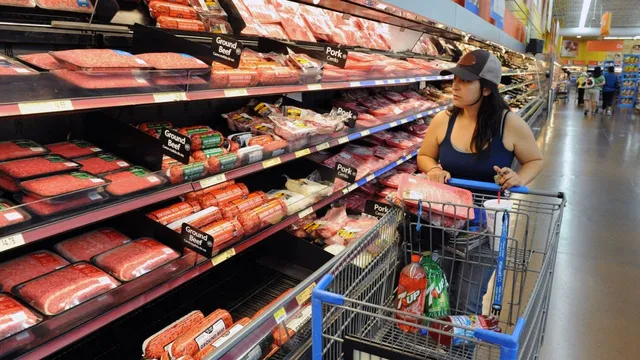
Walmart opens first case-ready beef facility in Kansas
2025-07-01 14:50- Walmart's new facility in Olathe, Kansas, allows for direct sourcing of Angus beef cuts, eliminating the middleman.
- The facility is expected to create 600 local jobs and will serve 600 stores in the Midwest region.
- This move is aimed at controlling costs, increasing food quality, and enhancing traceability in response to rising beef prices.
Express your sentiment!
Insights
In the United States, Walmart has recently opened a 300,000-square-foot case-ready beef facility in Olathe, Kansas. This facility is significant as it represents the company's first ownership and operation of such a facility, marking a shift in their meat sourcing strategy aimed at eliminating middlemen in the supply chain. By directly sourcing Angus cuts from Sustainable Beef LLC, which sources cattle from a local area, Walmart is increasing control over its beef supply, aiming to improve both quality and traceability, especially during a time when beef prices are rising due to low cattle inventories and strong consumer demand. This new facility not only allows Walmart to package and distribute beef more efficiently to 600 stores across the Midwest but also creates approximately 600 jobs in the local area. Such a move is seen as a strategic effort by Walmart to not only lower costs by reducing reliance on third-party processors but also to enhance their perception as a provider of quality fresh foods. The facility began operations amid rising beef prices, attributed to a 74-year low in U.S. cattle inventories, compounded by high consumer demand. The rising prices, as reported in various agricultural data, highlight the complexities Walmart faces in the meat industry, where factors like tariffs and supply chain disruptions impact costs. Analysts have indicated that by investing in its own beef production capability, Walmart aims to shield its customers from price increases that are currently being felt across the grocery sector. This is particularly critical as Americans are adjusting their buying habits in light of rising meat prices, often turning to more affordable sources of protein. Furthermore, the facility in Kansas aligns with Walmart's broader commitment to invest significantly in American-made products by 2031. With this investment, Walmart intends to not only bolster its supply chain resilience but also improve perceptions about the quality of its fresh food offerings, which are paramount to maintaining and growing its market presence amidst increasing competition. Overall, Walmart's initiative exemplifies the company's proactive approach in addressing supply chain challenges while catering to growing consumer preferences for affordable and high-quality food options.
Contexts
The importance of transparency in food supply chains cannot be overstated in today’s world where consumers increasingly demand to know the origins and safety of their food. Transparency plays a critical role in ensuring that food products are sourced and processed in a manner that is ethical and sustainable. It encompasses the traceability of ingredients from farm to fork, allowing consumers to make informed choices about the food they purchase. With rising concerns about food safety, environmental impact, and labor practices, consumers often seek assurance that their food is produced responsibly. Transparency meets this need by providing clear information on sourcing, production processes, and potential risks associated with food products. Furthermore, transparency in food supply chains can significantly enhance corporate accountability. When companies operate with transparent practices, they are more likely to adhere to regulations and standards that safeguard public health and sustainable practices. This kind of accountability builds consumer trust, which is vital for brand loyalty. In a market where consumers can easily choose alternative products, maintaining a trustworthy reputation is essential for food companies. Additionally, transparency helps in minimizing fraud and ensuring authenticity in food labeling, addressing concerns over mislabeling and contamination. The benefits of transparency extend beyond consumer trust and corporate responsibility; it also contributes to improved supply chain efficiency. By embracing transparency, companies can identify and address inefficiencies within their supply chains, leading to better product quality and reduced waste. Additionally, a transparent supply chain allows for quicker identification of potential risks or disruptions, enabling businesses to respond proactively to challenges. Various technology solutions, such as blockchain and IoT, have emerged to facilitate transparency, offering secure, traceable information that can be accessed by all stakeholders in the supply chain. In conclusion, the importance of transparency in food supply chains is paramount, impacting consumer choices, corporate accountability, and overall efficiency. As consumers become more educated and concerned about where their food comes from, it is imperative for companies to adapt by adopting transparent practices. This not only benefits businesses in terms of reputation and consumer loyalty but also fosters a more sustainable and ethical food system. Investing in transparency is not merely a compliance issue; it is an opportunity for innovation, trust-building, and ultimately, the enhancement of the overall food supply chain.